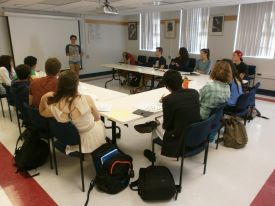Richard Ruiz, who heads the UA Department of Mexican American Studies, has turned to crossword puzzles to teach students about the implicit meaning of language.
Consider this crossword puzzle clue: The capital of Massachusetts? And know that while the answer contains six letters, it’s not Boston.
Give up? The answer: the U.S. “dollar.”
Such is the type of word puzzle Richard Ruiz, head of the University of Arizona Department of Mexican American Studies, is teaching students in a course informing them about how individual words can convey several different meanings depending upon the context.

A group of 16 students learn in a puzzle course how themes and clues found in cross word puzzles can stimulate their way of thinking about life and current issues. (Photo credit: Richard Ruiz)
Ultimately, in “The Examined Life Through Word Puzzles” class, Ruiz is using a playful form to help his students not only think about languages, but also learn and understand how the English language is formed.
“There are many ways we can think about one word contrasting its way to something else,” said Ruiz, also a professor in the UA Department of Teaching, Learning and Sociocultural Studies. “One word can stand for many concepts. Capital also means currency, money.”
Much of Ruiz’s curriculum offers students the opportunity to analyze the metaphorical way of thinking about language. Like the example given at the beginning of this article, a question mark that comes after a crossword puzzle clue always means the answer is not the first word that comes to mind, and that you should think again, Ruiz said.
Offered to first-year Honors College students, the one-unit course focuses on crossword puzzles, with students working on one major crossword puzzle every week. Also, students read and analyze “Planetwalker” by John Francis, which is required reading for students in the college, along with two other books on crossword puzzles. They also keep a reflection journal.
Honors College student Alex Mann, a mathematics freshman, took the course because he finds the English language to be very peculiar.
But until now, he had not considered how words can be used in many different ways, and how clues with question marks at the end require thinking outside the box.
“I think about the meaning of words a lot more now and why we say certain phrases,” Mann said. “I think that is very interesting.”
The course explores a wide range of topics focusing on themes and clues that indicate how language reflects peoples’ lives. With a lot of creativity and invention put into language, Ruiz said the course challenges students to consider how meanings of words can provoke a person’s thinking.
“Language itself is a reflection on life and if you are changing your ideas about language then it can change a lot of what you are thinking about with respect to life,” Ruiz said. “That changes the way you look at life, looking at languages and words gets you to look on how you evaluate people.”
While the class is heavily focused on the dynamics of word puzzles, it also examines different components of language, such as metaphors, figures of speech, sociolinguistics and language variation, to name a few, in order to help students understand how communication is created from individual words.
For example, adding a suffix to a word creates a whole new word and “all of a sudden you’ve created a verb out of something else,” Ruiz said, emphasizing that this is what language is; language is about considering how communication is created.
“We learn about ways in which language changes over time from one place to another,” Ruiz said. “We look at how language is conceiving of the relationship between the clue and the answer. That is one of the most important aspects of this (class).”
One word can stand for many different concepts depending on its structured placement. This is referred to as a semantic alternative, which the class focuses on.
“There are many ways we can think about one word contrasting its way to something else,” Ruiz said. “How can a word stand for something else than what you are thinking about? We do this a lot.”
For example, here is another puzzle. The clue: The particular cheese in mind is “made” backwards. The answer is four letters.
Give up? The answer is Edam, a Dutch cheese, which is, literally, “made” spelled backward.
“You have to put yourself at this whole different way of thinking,” Ruiz said. “This is how one can play with words, ideas and concepts.”
– By Yara Askar
*Source: The University of Arizona
